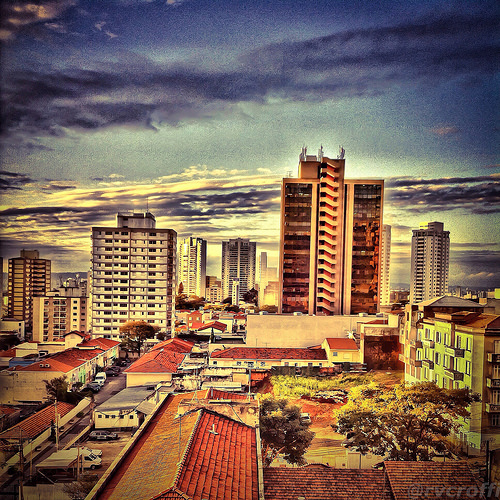
Image from rvcroffi.
Our smart cities are perhaps too intelligent for our own good, argues The Guardian in a recent editorial. The data collection that both characterizes a smart city and makes life more seamless within such a city is a mixed blessing: While data is changing life from the street up, who — or what agency — is monitoring the intricacies of life from above? “[A] vast network of sensors amounting to millions of electronic ears, eyes and noses – also potentially enable[s] the future city to be a vast arena of perfect and permanent surveillance by whomever has access to the data feeds,” opines The Guardian.
What is a smart city, exactly? The Smart City Council, a self-described “advisor and market accelerator” that advocates for smart and sustainable cities, suggests that smart cities are those with “digital technology embedded across all city functions,” gathering “data from smart devices and sensors embedded in its roadways, power grids, buildings and other assets, and sharing this info “via a smart communications system that is typically a combination of wired and wireless.”
In theory, smart cities try to drop costs and resource usage, respond quicker and more efficiently to its residents’ needs, and encourage sustainability through nearly omnipresent technology, like sensors embedded in water or waste systems to calculate usage, or cameras that monitor traffic — and pedestrians. A smart city operates on a philosophy that The Guardian describes as “Better living through biochemistry gives way to a dream of better living through data.”
The “smart city” isn’t a new concept — in fact its roots can be traced back to Houston, Texas, where automated traffic lights debuted in 1922 — but today’s internet connectivity is rendering the smart city plan a veritable one for technophiles in power around the world — even in areas outside the pioneering but likely metropolises like San Francisco, Boston, Stockholm and London. Take India’s prime minister, who is planning to build 100 smart cities; or consider, as CNN reports, a litany of evolving smart cities including Bogota, Colombia; Masdar, UAE; Guadalajara, Mexico; Vilnius, Lithuania, Lima, Peru; Dholera, India… and the list goes on.
The Guardian’s argument is a strong one; voicing fears of the citizen playing the role of an “unpaid data-clerk, voluntarily contributing information to an urban database,” or merely a “smoothly moving pixen,” it imagines nightmarish scenarios wherein cities’ operating systems (and driverless cars, incidentally) crash, harming the people whose lives they were ostensibly invented to make easier.
Yet truly smart cities aren’t about individuals; they are about populations on the whole and how to best facilitate groups of people navigating the urban landscape. An improved alternative to the common strategy of simply implementing smart-city solutions are, according to The Guardian, visualizations and simulations that allow data technologists to test out policies video game-style before introducing them in the real world. Justin Lyon, CEO of Simudyne — a city-simulation company that provides depictions, similar to the video game SimCity, of hospital evacuations and other strategies — explains his focus on creating visualizations of how London’s 30 million-person population would react to a snowstorm: “While I’m not interested in a specific individual, I’m interested in the emergent behavior of the crowd.”
Of course, open data systems mean that individuals can be tracked. Tracking particular people can be useful in, for example, a hospital setting, to help emergency patients get care faster and more efficiently. But it can also be used by what The Guardian calls potentially “nefarious bodies.” One example is a set of information from the agency Transport For London’s bike-share program, which included locations, dates and times for individual bikers. The information was so detailed that “with a little effort, it’s possible to find the actual people who have made the journeys,” reported one engineer’s blog earlier this year.
These concerns over privacy are not unfounded. It may be too late for the Google- and Facebook-acclimated residents of existing cities to reclaim their right to digital anonymity. But moving forward, it will be the responsibility of those, particularly in developing countries, to weigh the pros and cons of a more seamless urban landscape — from easy-to-hail cabs and buildings with automatic climate control to sensor-dense electricity systems — with personal privacy. The smart city’s technological limits will contract or expand as city dwellers determine their own balance of modern utilities and conveniences against the relatively new concept of digital personal privacy… if they can react quickly enough.